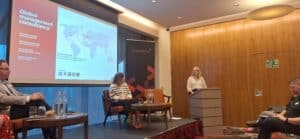Last month, the Change Management Institute, Ireland hosted a panel event in Cork, Ireland, bringing together leaders across multiple industries to explore the human aspect of AI adoption. The session, moderated by Louise O’Rourke, our Change Management Lead based in Ireland, focused on how organisations are building trust, capability and culture to enable confident, responsible use of artificial intelligence.
Here are some of our key takeaways from the discussion:
- AI as an enabler, not a replacement: Panellists shared practical examples of AI elevating human capability across customer success, operations, HR, finance and change management. Trend Micro uses AI to surface customer insights and health trends, while Teamwork.com embeds it to automate tasks and drive innovation. Dell Technologies applies AI to transform change management through real-time sentiment and impact analysis. We adopt AI to accelerate insight generation, freeing consultants to focus on critical thinking and client collaboration.
- Building trust and transparency: Early adoption challenges centred on trust, accuracy and fear of job impact. Organisations addressed this by piloting AI with champion users, , iterating based on feedback, and reinforcing responsible use. Open communication and transparency proved essential to overcoming resistance and building confidence
- Capability and culture: Successful adoption depends on building skills and fostering peer advocacy. Dell introduced mandatory quarterly AI training and an Early Adopters Space, while Teamwork.com, Trend Micro, and Argon & Co used peer learning and community sharing to build confidence and responsible use. Governance and responsible use All organisations emphasised the importance of governance, with “humans in the loop” for key decisions and robust monitoring of AI outputs. It was clear that formalising the use of AI tools through structured licensing and clear guidelines, enabling teams to deliver faster, data-driven recommendations was key
- Measuring impact: Adoption metrics included time saved, reduced cycle times, service-level improvements and qualitative feedback on user confidence. Teamwork.com tracked model accuracy and employee engagement, ensuring AI remains a continuously improving capability rather than a one-off initiative
- The role of change managers: Change managers were recognised as pivotal in bridging agile, team-level AI adoption with enterprise-wide transformation. Their role is to connect small-scale experimentation with strategic business value, ensuring that people remain at the heart of digital change.
On reflection, the underlying message from the discussion was technology alone does not transform organisations, people do. Sustainable AI adoption is achieved when employees are informed, equipped and inspired to use new tools confidently. The future belongs to organisations that view AI as a catalyst for human growth, not a substitute for it.


